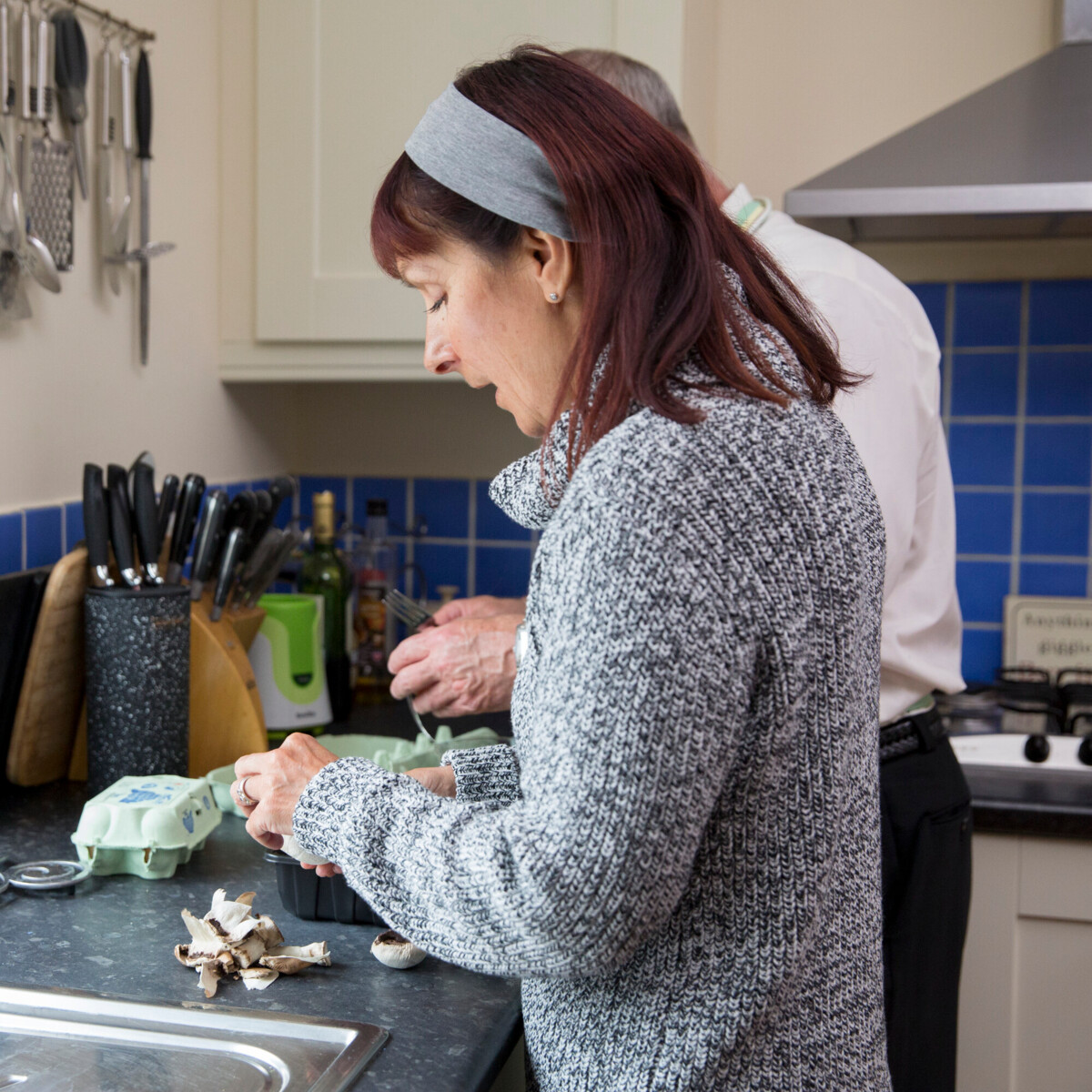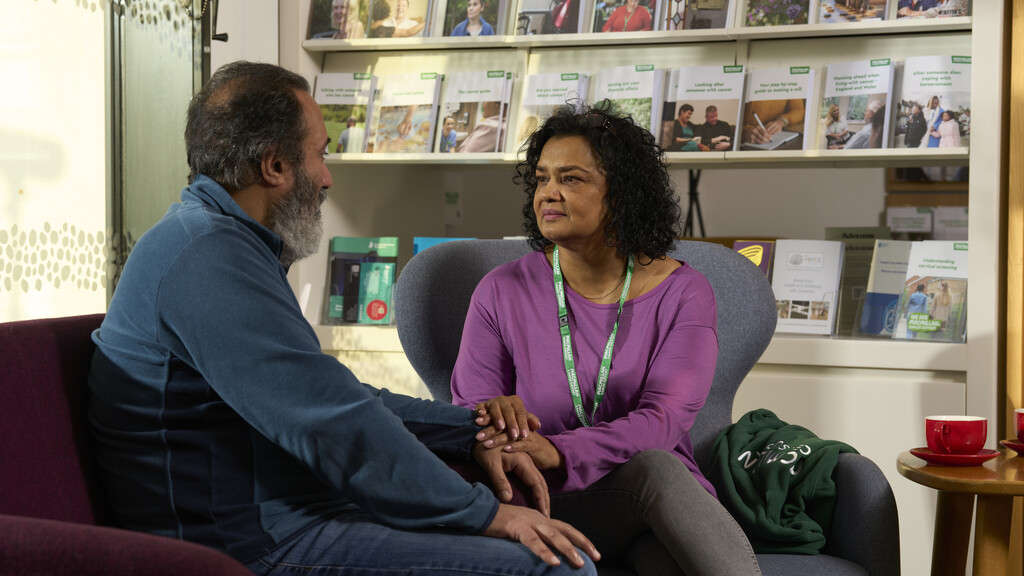What to do when you can't sleep: Insomnia and cancer
Sleep disturbance or difficulty sleeping is a common problem for people living with cancer. If you are struggling to get enough sleep, you may be feeling stressed and anxious. You may worry about how you're going to cope the next day, or whether poor sleep might impact your treatment. No matter what you're going through, you are not alone.
What causes insomnia
Difficulty sleeping can happen for a number of reasons. It may be a side effect of treatment (e.g. chemotherapy, radiotherapy), or it might be related to cancer symptoms.
You might be worrying about a cancer diagnosis or the impacts of treatment. Feelings of anxiety are common when dealing with cancer, and may negatively impact your sleep.
Whatever the cause, struggling with sleep can be stressful. It can sometimes feel like a vicious cycle, where worrying about not sleeping makes it even harder to fall asleep when it's time to go to bed.
What you can do
If you think your fatigue or sleep issues are being caused by treatment, speak to your GP or cancer care team. They will be able to suggest or prescribe additional treatments that may help.
There are also things you can do to reduce the feelings of stress or being overwhelmed that can arise from struggling with insomnia, which we will explore in this blog.
Reducing anxiety with mindfulness
Even if you can't fall asleep, managing to relax while lying down can have a significant impact on your energy levels the next day.
Mindfulness involves focusing on being present in the moment, by paying attention to your breathing, thoughts, and sensations in your body around you. It can help you process your thoughts and feelings, and refocus your mind on calmly being present in the moment.
Here are three techniques you can try.
1: Breathing
- Deep breathing: start by getting comfortable, such as lying down in bed. Then breathe in slowly and deeply through your nose. You should feel your stomach inflate (rise) as well as your lungs. Breath out slowly through your nose or mouth
- Box breathing: for this exercise, inhale through the nose for 4, hold the breath for 4, exhale through the mouth for 4, and hold the breath for 4 before we inhale again You can try different variations of these exercises, such as breathing in for 4, holding for 7, and exhaling for 8
- Don't force it if it feels difficult, as this can make you feel more stressed.
Explore more breathing techniques at Headspace.
2: Meditation
Meditation exercises can take many forms. They usually involve practicing some kind of visual imagery.
- Body scans are one technique which can help to relax. This is where you mentally scan your body and focus on how each part is feeling. Start by focusing your attention on your toes and repeat the practice all the way up the body, allowing 20-30 seconds to focus on each body part. As you do this, keep taking long, deep breaths.
Other meditation techniques involve:
- Silently repeating a calming word to yourself for 10 minutes
- Imagining breathing heat, coolness, or a feeling of relaxation into the painful areas of your body.
When performing any of these exercises, if your mind wanders and starts worrying again, that's okay. Gently bring your attention back to what you were doing before.
Remember that while relaxation techniques might help you fall asleep, this should not be the goal. The more we focus on trying to fall asleep, the harder it often becomes. Instead, try practicing these techniques with the intention of reaching a relaxed state that will carry you through the night, regardless of whether you sleep or not. This will help you recuperate more energy for the morning.
Read more about mind-body therapy techniques.
3: Try a relaxation or sleep app
Mindfulness or meditation apps can be very helpful in guiding you through these techniques. They can make it easier to focus if your thoughts are feeling overwhelming.
- Sleepio is an app that you can access for free if you have cancer. It uses guided Cognitive Behavioural Therapy (CBT) techniques to help improve your sleep. You can sign up to Sleepio for free here
- There are apps that offer customisable sleep sounds that can be relaxing to listen to while you are awake at night. Many of these are free, with paid ads within the app
- Other apps you may have to pay a subscription for, such as Headspace.
See also:
- Ways to establish a helpful sleep routine
- Staying active to help boost energy
- Mind - guide to mindfulness for sleep
Dealing with negative thoughts during the night
It is important to recognise that you can't control your thoughts. However, it can help to acknowledge any persistent thoughts and worries, without trying to fight against them or force them away.
A practical way to do this is to keep a notebook beside your bed and write down any recurring thoughts as they appear in your mind. You can do this before you go to bed, or through the night. This can help you keep calm whenever your thoughts start to feel overwhelming.
Online support
If you are worrying about cancer or waiting for results, you can find support by talking to others going through a similar thing.
- Our Online Community is a free to use network where you can talk to people who are also struggling with sleep and fatigue.
- The Awake and up all night group is an online support area for people who are awake at night. This discussion thread is for members who have trouble sleeping and looking for somewhere to talk, would like some company and support each other during the night and share some things you do that helps you get to sleep.
Cancer audiobooks and podcasts
If you're awake in the middle of the night and find yourself worrying about cancer, searching the internet may make you feel even more stressed. Looking at screens can also make your brain feel more awake, and make it harder to get to sleep.
- If you want more information about cancer and the treatments, you could try listening to an audiobook or podcast. We have a range of audiobooks that talk about cancer, treatments and tests.
- We also have a series of podcasts featuring guests talking about their cancer experiences and treatments, as well as life after cancer. Browse our Talking Cancer podcasts.
Get comfortable
Try to make yourself as comfortable as you can, even if you can't sleep. This will give your body a chance to rest and recover as much energy as it can for the next day. Making sure you feel comfortable also makes it easier to spend the night feeling calmer and less anxious. This can make a big difference to how you feel the next day, regardless of whether you fall asleep or not.
If you are in pain, there are home remedies you can try to help feel more comfortable. These include:
- applying heated wheat bags or hot water bottles to ease inflammation and aches
- using ice packs to relieve pain
You can alternate between hot and cold for additional relief.
For severe or persistent pain, you should talk to your cancer care team. They will be able to suggest a pain treatment plan to help manage your symptoms as part of your overall cancer care.
Coping with fatigue
If you are experiencing long term sleep deprivation, there are things you can do to help cope during the day. For example, you may decide to delegate or prioritise different tasks or activities.
We have a booklet and audiobook with more information on ways to cope with long term fatigue.
Working with insomnia
If you're employed, you might be struggling to cope with work because of feeling fatigued. Under the Equality Act 2010, employers must look at ways to adjust the work environment to support employees with disabilities or other needs.
This includes things like:
- Adapting your working hours, e.g. allowing for a later start time in the morning
- Flexible working, such as working from home
We have more information on work and cancer.
Get support

Support groups

Support Line
About our information
This blog was written by a former Macmillan employee, the content has since been reviewed.
Learn more about how we produce our cancer information.
Read more
-
Blogs 04 Apr 2023In this article we highlight some diet and cancer risk claims you may have seen on TV or in the news and give you more of the facts behind these headlines.
-
Blogs 12 Jun 2025There’s a lot of interest in weight loss drugs right now. In this blog we take a look at some of the questions people with cancer might have.
-
Blogs 05 Jun 2025Find local cancer support services near you with our simple online search. From emotional support to practical help, get the support you need.





